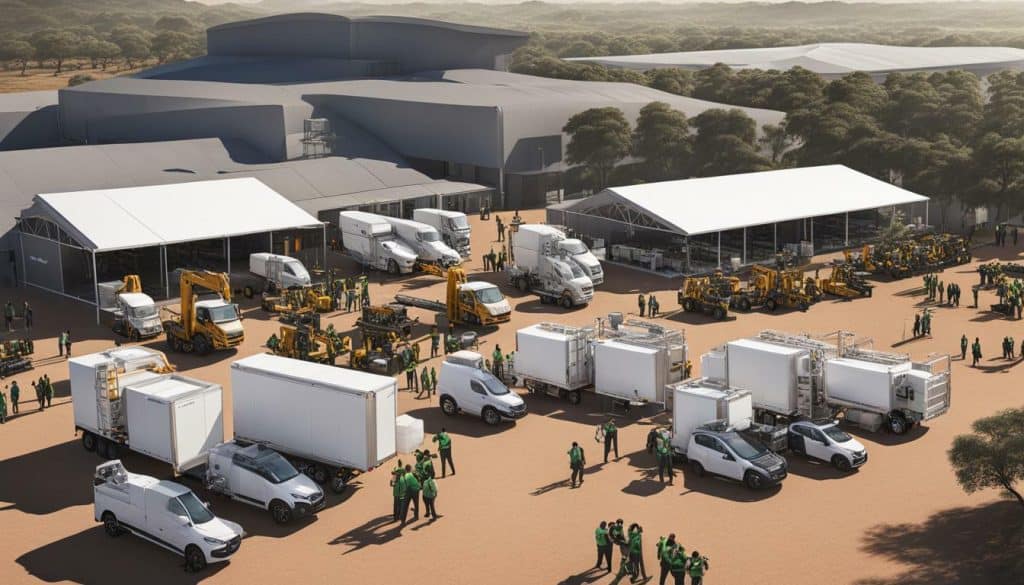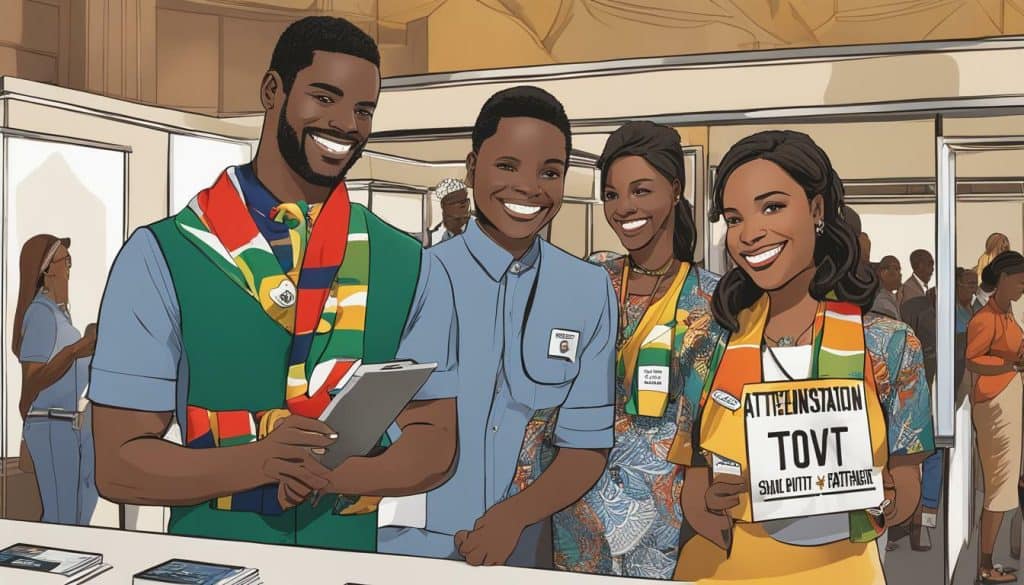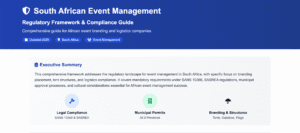Welcome to B&W Productions’ comprehensive guide to managing events in South Africa. Whether you’re planning a corporate conference, product launch, or social gathering, effective event management can make all the difference in creating a memorable experience for attendees. From event planning and coordination to logistics and execution, this guide will provide you with the tools and strategies needed to successfully manage your next event in South Africa.
Key Takeaways:
- Effective event management is crucial for creating a memorable experience for attendees.
- Understanding the fundamentals of event planning, coordinating logistics, organizing the event, and budgeting are key factors in successful event management.
- Marketing your event, executing a memorable event, navigating cultural considerations, and harnessing technology can also contribute to the success of your event.
The Fundamentals of Event Planning
Organizing a successful event requires careful planning, attention to detail, and effective communication. B&W Productions has put together this guide to help you master the art of managing events in South Africa. In this section, we will cover the basics of event planning and the key considerations that need to be taken into account when planning an event.
Defining the Objectives
The first step in event planning is to define the objectives of the event. This will help you to determine the target audience, select the appropriate venue, and create a relevant program. Whether you are organizing a conference, gala dinner, or product launch, it is important to understand the goals of the event and how it fits into your wider marketing and business strategy.
Determining the Target Audience
After defining the objectives of the event, the next step is to determine the target audience. Who do you want to attend the event? What are their interests and preferences? This will help you to tailor the program and marketing messages to appeal to the target audience.
Setting a Budget
Once you have defined your objectives and target audience, it is important to set a budget for the event. This will help you to determine the scope of the event and the resources required to deliver it successfully. It is important to ensure that the budget is realistic and takes into account all of the necessary expenses, including venue rental fees, catering, audio-visual equipment, and marketing expenses.
Creating a Detailed Plan and Timeline
With the objectives, target audience, and budget in place, you should create a detailed plan and timeline for the event. This plan should include all of the key milestones, deadlines, and tasks required to deliver the event successfully. It is important to review the plan regularly and make adjustments as necessary to ensure that you stay on track.
By following these fundamentals, you will be well on your way to planning a successful event in South Africa. In the next section, we will explore the logistics of event management in more detail.

Coordinating Event Logistics
When it comes to managing events, coordinating logistics is a crucial part of the process. B&W Productions, a leading event management company in South Africa, emphasizes the importance of attention to detail and organization in this stage.
The first step in event logistics is securing a suitable venue. Consider factors such as capacity, location, accessibility, and amenities when choosing a venue that aligns with your event’s objectives and target audience.
After securing the venue, managing vendors and suppliers is the next important step in event coordination. From catering to audiovisual equipment and decor, B&W Productions recommends researching and securing reputable vendors who can deliver quality services within your budget.
Transportation and accommodations are additional logistics considerations for events that may attract attendees from outside of the immediate area. Ensure that transportation is convenient and accessible, and consider negotiating discounts with hotels or partnering with local accommodation providers.

Lastly, attention to detail is crucial during the event itself. Test equipment and systems beforehand to avoid technical glitches, and ensure that staff are well-trained and prepared to handle any issues that may arise during the event. B&W Productions advises having a contingency plan in place to mitigate any unexpected issues.
Organizing the Event
Now that you have determined the objectives, target audience, and budget for your event, it’s time to start organizing the event itself. This stage requires careful planning and coordination, as it involves numerous moving parts that must come together seamlessly on the day of the event.
The first step in organizing the event is to create an event schedule. This schedule should include all of the activities and sessions that will take place during the event, as well as the times and locations of each. Make sure to leave ample time for breaks, lunch, and any other necessary downtime.
Once you have a schedule in place, it’s time to start coordinating your speakers or performers. Reach out to each individual or group to confirm their participation and discuss any necessary logistics, such as travel arrangements or technical requirements. B&W Productions are experts at working with international talent and can assist with negotiations and liaison with speakers and performers.
In addition to your speakers or performers, you will also need to manage event registrations and ticketing. Consider using an event registration platform or ticketing service to streamline this process and ensure smooth entry and flow throughout the event.
Effective communication and teamwork are crucial during this stage of event planning. Make sure to keep your team informed and up-to-date on any changes or developments, and be prepared to pivot if necessary. With careful planning and execution, your event is sure to be a hit.

Marketing Your Event
To ensure a successful event, effective marketing is essential. B&W Productions recommends using a mix of channels to reach your target audience and build excitement for your event. Here are some strategies for effective event marketing in South Africa:
| Strategy | Details |
|---|---|
| Social Media | Use popular social media platforms like Facebook, Instagram, and Twitter to promote your event and engage with your target audience. Post teasers, behind-the-scenes content, and speaker or performer spotlights to generate interest. Create an event-specific hashtag to encourage attendees to share their experience on social media. |
| Email Marketing | Build a targeted email list and send regular updates and reminders to keep your audience informed and engaged. Use compelling subject lines and include calls-to-action to encourage readers to buy tickets or share the event with their network. |
| Traditional Advertising Channels | Consider using traditional advertising channels like radio, TV, and local newspapers to reach a wider audience. Partner with media outlets to secure coverage of your event. |
| Influencer and Industry Partnerships | Collaborate with relevant industry influencers or partners to promote your event and expand your reach. Partner with local businesses or organizations to offer exclusive discounts or perks to their customers or members. |
Remember to create a strong event brand and ensure all marketing materials, including event signage, tickets, and promotional materials, are consistent with your brand identity. 
Budgeting for Success
When planning an event in South Africa, creating a realistic budget is crucial to its success. B&W Productions suggests starting by outlining all the necessary expenses, including venue rental, equipment rentals, catering, marketing materials, and staffing. Don’t forget to also estimate any unexpected costs that may arise.
Tip: It’s always wise to budget extra for any unforeseen expenses that may arise.
Once you have a clear idea of all the expenses, create a spreadsheet to track the costs throughout the planning process. Use this document to monitor your expenses and ensure that you stay within your budget. Be sure to negotiate with vendors and suppliers wherever possible to help keep costs down.
Tip: Consider partnering with sponsors or advertisers to help offset some of the costs.
B&W Productions also suggests prioritizing the most important expenses and allocating the largest portion of your budget towards them. For instance, if having top-notch entertainment or catering is crucial to the success of your event, allocate more of your budget towards these areas.
Tip: Avoid sacrificing quality for a lower price, as this can affect the overall success and guest experience of the event.
Remember to keep a detailed record of all expenses, even small ones. This will help you evaluate the effectiveness of your budget after the event.
| Expense | Estimated Cost | Actual Cost |
|---|---|---|
| Venue Rental | R40,000 | R42,000 |
| Catering | R20,000 | R19,500 |
| Speaker Fees | R15,000 | R14,000 |
| Marketing Materials | R10,000 | R9,800 |
| Staffing | R8,000 | R8,500 |
| Miscellaneous Expenses | R5,000 | R4,850 |
| Total | R98,000 | R98,650 |
By following these budgeting tips from B&W Productions, you can create a well-planned and financially successful event in South Africa.

Executing a Memorable Event
When it comes to executing an event, it’s all about attention to detail and providing a memorable experience for your attendees. As the day of the event approaches, make sure you have a clear plan in place for every aspect of the event, from signage to registration to entertainment. Here are some key elements to keep in mind:
Effective Signage: Clear and informative signage is essential for guiding attendees through the event. Make sure all signage is easy to read and strategically placed throughout the event space. Consider incorporating B&W Productions branding into your signage to create a cohesive look and reinforce your brand image.
Smooth Registration Processes: The registration process should be easy and streamlined for attendees. Consider using technology such as mobile event apps or QR codes to speed up the registration process. Make sure all staff members are well-trained and equipped to handle any issues that may arise during registration.

Engaging Speakers or Entertainment: The speakers or performers at your event can make or break the experience for attendees. Choose speakers or performers who are highly engaging and relevant to your target audience. Consider incorporating interactive elements into presentations or performances to keep attendees engaged.
Attentive Customer Service: The level of customer service provided at your event can greatly impact attendee satisfaction and the overall success of the event. Make sure all staff members are well-trained in customer service and are prepared to handle any questions or issues that may arise. Encourage staff to go above and beyond in providing exceptional customer service.
Remember to also have contingency plans in place for any unforeseen issues that may arise during the event. With careful planning and attention to detail, you can ensure that your event goes smoothly and leaves a lasting impression on attendees.
Navigating Cultural Considerations in South Africa
South Africa is a diverse country with a rich cultural heritage. When planning an event in South Africa, it is important to consider the different cultures and traditions of your attendees. By understanding and respecting these cultural nuances, you can create an inclusive and welcoming environment for all.
B&W Productions understands the importance of cultural sensitivity in event management and has experience working with a range of cultures in South Africa. Here are some tips to help you navigate cultural considerations when planning your next event:
Cultural Awareness
Take the time to research and understand the cultural backgrounds of your attendees, speakers, and performers. This will help you avoid cultural faux pas and ensure that everyone feels respected and included.
Language Considerations
South Africa has 11 official languages, and it is important to consider language when planning your event. Ensure that all communication, including signage, registration forms, and event materials, are available in the relevant languages.
If you are hosting an international event, consider hiring interpreters to ensure that all attendees can fully participate in the event.
Catering
South African cuisine is diverse and delicious, but it is important to consider the dietary restrictions of your attendees. Ensure that vegetarian, vegan, halal, and kosher options are available.
Dress Code
South Africa has a range of traditional dress styles, depending on cultural heritage. If you are hosting an event with a formal dress code, ensure that attendees are fully informed of the dress expectations and are respectful of traditional dress styles.
Entertainment
When selecting entertainment for your event, consider the cultural background of your attendees. Ensure that the entertainment is appropriate and respectful, and avoid any entertainment that may be considered offensive or insensitive.
Conclusion
By taking the time to consider cultural considerations when planning your event, you can create a welcoming and inclusive environment for all attendees. B&W Productions has the experience and expertise to help you navigate these considerations and create a successful event that respects and celebrates South Africa’s diverse cultural heritage.

Harnessing Technology for Event Management
When planning events, technology can be your most valuable tool for effective event management. B&W Productions understands the importance of integrating technology into your event planning process to ensure seamless execution and a memorable experience for attendees.
One of the most common technology platforms for event management is event management software. This software can assist with managing registrations, ticketing, and sending reminders to attendees. It also allows you to track attendee engagement and feedback, which is valuable for future events.
Mobile apps are another effective tool for event management. A custom app for your event can provide attendees with important information, such as schedules, maps, and speaker bios. It can also enhance engagement through interactive features like live polling and Q&A sessions.
In today’s digital age, virtual event platforms are also gaining popularity. These platforms allow for remote attendance and engagement, which can expand your event’s reach and accessibility. With the right technology and platform, you can create an engaging virtual event experience for attendees.
Overall, technology can be a powerful tool in event management, but it is important to choose the right platform and integrate it seamlessly into your planning and execution strategy. B&W Productions can assist you with leveraging technology to enhance your event and create a successful experience for all.

Conclusion
Effective event management is key to creating a memorable experience for your attendees and making a lasting impression. By mastering the art of managing events in South Africa, you can ensure that your event runs smoothly and achieves its objectives. An essential aspect of this process is understanding event management in South Africa, which encompasses local customs, preferences, and logistical nuances. By integrating these elements into your planning, you can create culturally relevant experiences that resonate with attendees. Additionally, leveraging local vendors and resources can enhance the authenticity of your event while supporting the community.
Remember to consider the fundamentals of event planning, including defining your objectives, determining your target audience, and setting a budget. Coordinating event logistics is also crucial, from securing the right venue to managing vendors and suppliers.
Organizing the event itself requires effective communication and teamwork, from creating an event schedule to managing registrations and ticketing. Marketing your event is also important, using social media and other channels to create a strong event brand.
When budgeting for your event, be sure to create a realistic budget and track your expenses throughout the planning process. Finally, executing a memorable event requires attention to detail, contingency plans, and excellent customer service.
It is also important to navigate cultural considerations in South Africa, respecting the country’s diverse cultures and traditions. Harnessing technology for event management can also be beneficial, using tools such as event management software and mobile apps.
At B&W Productions, we understand the importance of effective event management and are dedicated to helping you achieve your event objectives. By implementing the tips and strategies discussed in this article, you can plan and manage successful events in South Africa. Partnering with experienced event management companies in South Africa can also elevate your event’s quality and reach. These professionals bring valuable insights and local knowledge, ensuring that every aspect is meticulously handled. Embrace collaboration and innovation to create memorable experiences that resonate with your audience.
Are the Strategies for Managing Corporate Events Different in South Africa?
The strategies for managing successful corporate events in South Africa may differ from other regions due to cultural diversity and local business practices. Understanding local customs, language preferences, and networking styles becomes essential. Incorporating traditional South African elements, such as indigenous entertainment or cuisine, can enhance attendee experience and foster meaningful connections. Adaptability, effective communication, and a keen awareness of local dynamics are crucial for organizing successful corporate events in South Africa.
FAQ
Q: What is event planning?
A: Event planning is the process of organizing and managing all the elements of an event, such as determining objectives, setting budgets, coordinating logistics, and executing the event to achieve its goals.
Q: Why is event management important?
A: Effective event management ensures that all aspects of an event are well-coordinated and executed, resulting in a successful and memorable experience for attendees. It helps create a positive brand image and can lead to increased engagement and success for the event. Mastering event management techniques allows organizers to anticipate potential challenges and adapt swiftly to any unforeseen circumstances. Additionally, leveraging technology and effective communication channels can streamline operations and enhance attendee experiences. Ultimately, thorough planning and execution contribute to the event’s overall impact and success.
Q: What are event logistics?
A: Event logistics refers to the detailed planning and coordination of all the operational aspects of an event, including securing venues, managing suppliers and vendors, arranging transportation and accommodation, and ensuring all necessary resources are in place.
Q: How do you organize an event?
A: Organizing an event involves creating a well-structured plan and timeline, coordinating speakers or performers, managing registrations and ticketing, and effectively communicating with all stakeholders involved.
Q: How can I market my event?
A: You can market your event by utilizing social media platforms, implementing email marketing campaigns, utilizing traditional advertising channels, and collaborating with influencers or industry partners to promote the event and reach your target audience.
Q: Why is budgeting important for events?
A: Budgeting is crucial for events to ensure financial success and avoid overspending. It helps track expenses, allocate resources effectively, negotiate with vendors, and make informed decisions throughout the planning process.
Q: What makes a memorable event?
A: A memorable event is characterized by effective signage, streamlined registration processes, engaging speakers or entertainment, attentive customer service, and the ability to troubleshoot and adapt to unexpected situations.
Q: How should I navigate cultural considerations in South Africa when planning events?
A: It is important to understand and respect the cultural norms and diversity in South Africa when planning events. This includes being sensitive to different cultures and traditions, promoting inclusivity, and adapting event elements to suit the local context.
Q: How can technology help with event management?
A: Technology can assist in event management through the use of event management software, mobile apps for registration and communication, and virtual event platforms. These tools can enhance efficiency, improve attendee experience, and provide valuable data for analysis.




